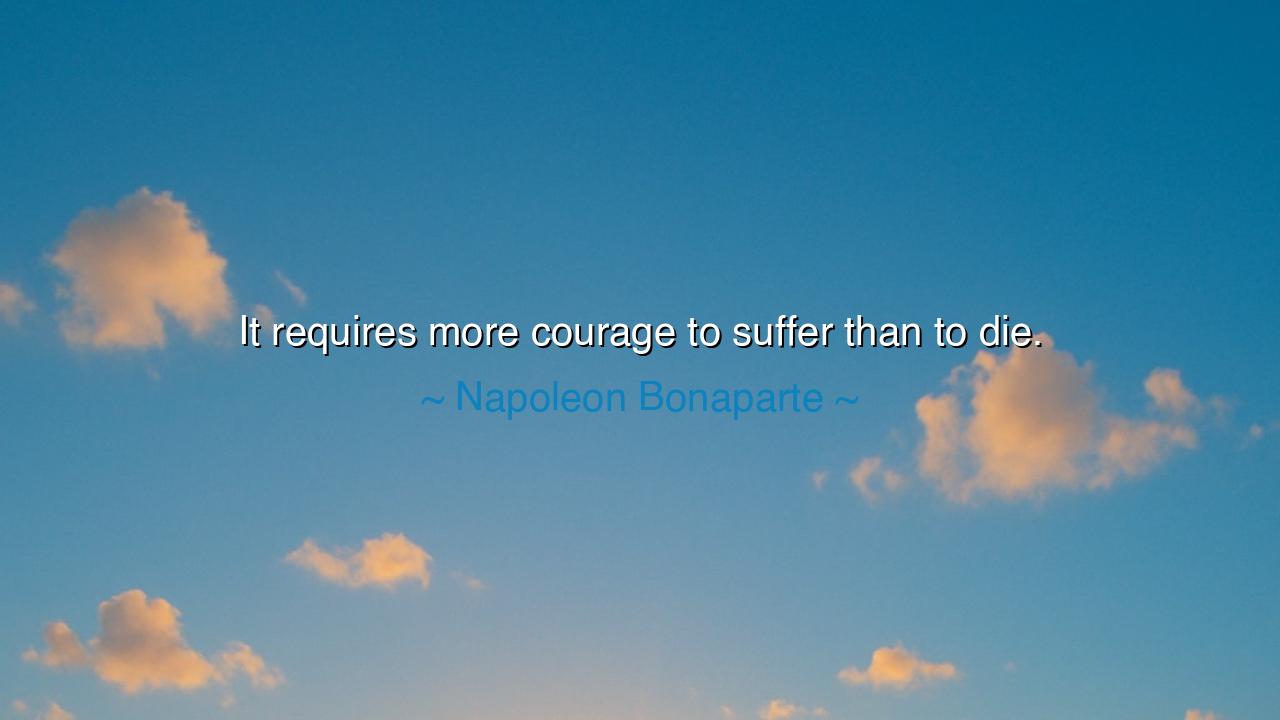
It requires more courage to suffer than to die.






“It requires more courage to suffer than to die.” Thus spoke Napoleon Bonaparte, a man who knew both the fire of triumph and the ashes of defeat. These words, born not from the mouth of a conqueror upon his throne, but from the heart of one who had fallen, carry a weight that only those who have endured the furnace of loss can understand. For to die, though terrible, is but a single act — swift, final, and merciful. But to suffer — to live on through humiliation, pain, despair, and regret — that demands a courage greater than the courage of the sword. Death is an escape; suffering is endurance. And endurance is the proof of the soul’s true strength.
When Napoleon uttered these words, he was no longer the Emperor of glory, no longer the master of Europe commanding legions beneath his eagle banner. He was an exile — a prisoner upon the lonely rock of Saint Helena, surrounded by the endless sea. There, stripped of power and betrayed by fate, he came to know the meaning of suffering. His body weakened, his empire gone, yet his spirit wrestled on. It was in this crucible that he understood what he had not grasped amid the roar of cannons — that true courage is not forged in victory, but in endurance. To live through defeat without surrendering the soul — that is heroism of a higher kind.
Throughout history, those who have suffered with dignity have shone brighter than those who died in glory. Consider Job, the ancient man of sorrows. All that he loved was taken from him — wealth, health, family — yet he did not curse the heavens. His endurance became a song for all time, echoing that to suffer well is a greater triumph than to fall nobly in battle. For the warrior who dies in a moment of valor is remembered for his death; but the one who lives in pain and still believes, still hopes, still loves — he is remembered for his life.
There is also the story of Nelson Mandela, who, centuries after Napoleon, proved this truth anew. Imprisoned for twenty-seven years, separated from his home and his people, he endured suffering that would have broken lesser men. Yet from that suffering, he emerged not bitter but radiant with compassion and strength. His chains, instead of crushing him, purified him. His patience conquered where violence could not. In him we see the living proof that suffering, borne with courage, becomes a weapon mightier than any sword.
Suffering, my children, is not the enemy of man — it is his hidden teacher. It strips away pride, softens the heart, and reveals the eternal flame within. To die is easy; it asks but a single breath. But to live through sorrow — to face each dawn when the heart is weary and the future uncertain — that is the trial of the strong. The ancients knew this well. The Stoics taught that pain is the anvil upon which the gods forge virtue. Marcus Aurelius, emperor and philosopher, wrote amidst plague and war that no evil can touch the soul unless it yields. Thus, the man who suffers with courage defeats despair itself.
Yet, we must not glorify pain, but honor the endurance it calls forth. For courage is not found in the absence of suffering, but in the will to walk through it without losing one’s humanity. When your world darkens, when loss and hardship weigh heavy upon you, remember this: the soul that refuses to break becomes indestructible. To endure without hatred, to weep without surrender, to rise after every fall — this is the work of the truly brave.
Therefore, let these words of Napoleon be your guiding flame: “It requires more courage to suffer than to die.” When trials come, do not seek escape, but seek meaning. When pain grips your heart, do not curse the heavens, but whisper: I will not be undone. For life is not measured by the ease of one’s days, but by the greatness of one’s endurance. And when your suffering has passed, you will stand taller — not because the pain has left you, but because you have learned to stand despite it. Then, and only then, will you know the noblest form of courage — the courage to live.






AAdministratorAdministrator
Welcome, honored guests. Please leave a comment, we will respond soon